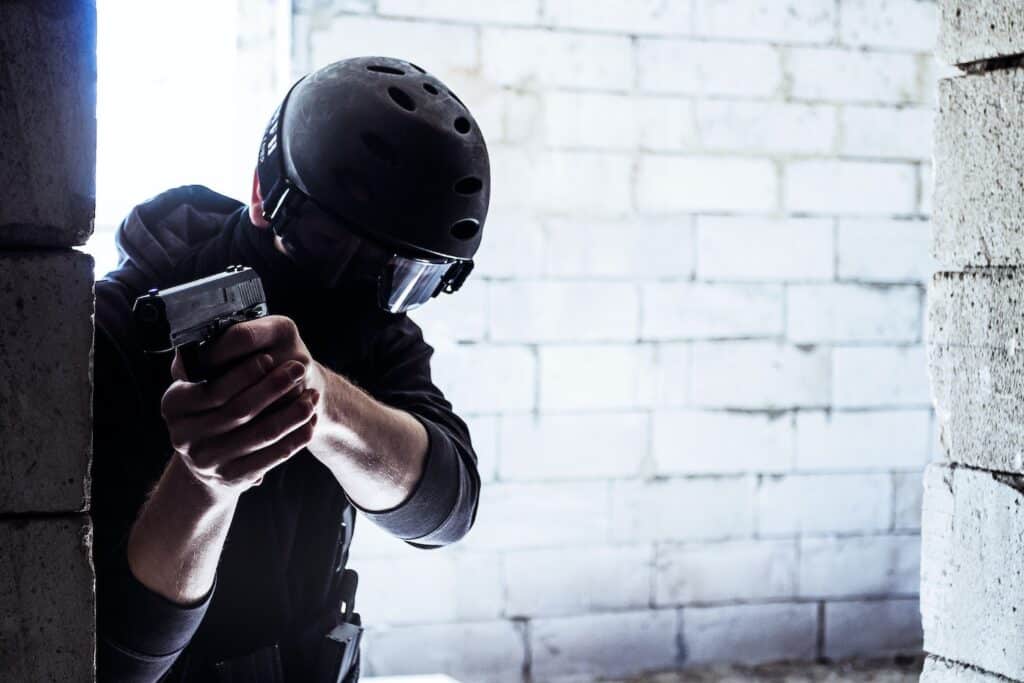Assault is the intentional or irresponsible infliction of physical harm on another person. There are several methods for committing an assault. Assaulting someone could involve, for instance, punching, shooting, biting, stabbing, or hitting them with a vehicle. Some of the most brutal assaults involve the use of a lethal weapon. When we consider lethal weapons, firearms and knives typically come to mind. However, for the purposes of the statute against assault, a deadly weapon might relate to nearly any instrument whose use produces serious injury.

Because assault with a deadly weapon, also known as aggravated assault, typically results in painful and permanent bodily injuries to the victim, the repercussions of a conviction for assault with a deadly weapon are severe. You could spend years in prison and be required to pay substantial fines, fees, and reparations. Therefore, if you need a criminal lawyer because you have been accused of assaulting someone with a dangerous weapon, you should contact an experienced New York Assault with a Deadly Weapon Lawyer who will evaluate the facts of your case and defend you aggressively until your case is resolved.
The attorneys at the Law Offices of Benjamin Greenwald have years of experience defending individuals accused of assault and other serious offenses, including domestic abuse, DWI, grand theft, and sex crimes.
Charges for assault with a deadly weapon
An assault with a dangerous weapon charge may include any of the following assault charges: assault in the first degree, assault in the second degree, assault in the third degree, or reckless endangerment in the first degree. For any assault to qualify as assault with a dangerous weapon, a deadly weapon must be utilized. The definition of a deadly weapon under New York law is a weapon that is readily capable of causing death or serious bodily damage. N.Y. Pen. Law § 10.00(12) . The act defines lethal weapons as firearms, knives, daggers, billies, blackjacks, plastic or metal knuckles.
Defenses to a charge of assault
To sustain an assault charge, the victim must suffer at least one “physical injury.” A physical injury is characterized by impairment of physical condition or severe pain. This implies that the victim’s damage must be more severe than small. If the victim suffers mild discomfort and transient bruising that does not leave a scar or necessitate hospitalization, it will be difficult for the prosecutor to prove the crime of assault. Other assault offences, such as second-degree assault, require the victim to receive a substantial physical injury. This implies that the prosecutor’s evidence must demonstrate that the victim’s injuries were so serious that there was a high likelihood that he or she would die or suffer a long-term bodily disability. N.Y. Pen. Law § 10.00 (10). If you can demonstrate that the victim’s injuries were not as severe as alleged, you may have a valid defense to second-degree assault charges.
Self-defense.
New York has a “justification” law that permits the use of physical action to protect oneself from imminent danger. N.Y. Pen. Law Section 35.15. Therefore, if you wounded the other person because you were defending yourself against them, you may have a valid defense to an assault allegation. To utilize the justification defense, however, the victim must have instigated the violence, not you. In addition, you cannot use greater force to defend yourself than is reasonable.
Consequences of a conviction for assault
Whether you go to jail or prison after being convicted of assault with a dangerous weapon depends on the precise offense for which you were convicted. A conviction for misdemeanor assault in the third degree carries a penalty that is far less harsh than a conviction for felony assault in the first degree. In most situations, a conviction for assault with a deadly weapon will result in a prison sentence.
Injunctions of protection
A judge may issue a temporary order of protection in favor of the victim as part of the criminal process. An order of protection is a court order compelling you to keep your distance from another person or to stop harassing or threatening them. If you have children with the victim, child support may be ordered. If you break a protective order, you may be subject to extra criminal penalties. The temporary order of protection may become a permanent order of protection based on the outcome of the assault with a dangerous weapon charges against you, meaning that it may be in effect for a number of years.
Long-term consequences
Even if you are convicted of misdemeanor assault with a deadly weapon and receive a sentence with minimal or no jail time, there will be additional repercussions. You will have a criminal record, which will make obtaining employment and other elements of your life more difficult. In addition, you will be prohibited from working in some occupations, such as teaching or law. In addition, you will be prohibited from owning firearms, serving in the military, or sitting on juries. Some colleges may deny admittance or prohibit campus residence. You will also be ineligible for certain government services, including welfare and federally subsidized housing.
No one ever expects to be accused of a crime. But if you find yourself in this situation, it’s important to have a skilled criminal defense attorney on your side. At the Law Office of Benjamin Greenwald, we understand how to navigate the criminal justice system and fight for the best possible outcome for our clients. We have experience handling a wide range of cases, from Assault with a Deadly Weapon to Grand Larceny. Whatever charges you’re facing, we will work tirelessly to get them reduced or dismissed. We know that being accused of a crime can be a stressful and frightening experience. But with our help, you can rest assured that you have someone in your corner who is fighting for your rights. Contact us today to schedule a consultation.

